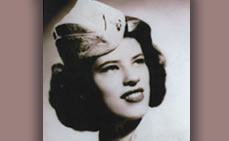WOMEN SHAPING HISTORY 2013
Elizabeth Shwal: WAVES '44, Barnard '51
Transcribed by Valentina Cordero
 How did you become a WAVE?
How did you become a WAVE?
I went to Barnard on the GI Bill because I was out of the Navy after WWII. My rank was aviation machinist mate, AMM, 2C (second class). I was in for 33 months. I went in as soon as I was 20 - I had to be 20 to get in - and I came out when the president said it was time for the volunteers to get out. WAVES stands for Women Accepted for Volunteer Emergency Service, that's what we did.
Everyone was excited about the war. Hitler was doing terrible things, and so was Mussolini. And this was an opportunity for young people to get involved. And they paid us $52 a month. But we weren't sent overseas because they were afraid of putting women on the boats, so the women had their own barracks, separate from the men. We worked with the men, we ate with the men, and we shot with the men, and we went on liberty with the men, but we didn't sleep in the same buildings.
What did you do as part of WAVES?
My first assignment was boot camp at Hunter College in the Bronx where they taught us to be Navy people, and we were there for several weeks. And then they sent us to different training schools, I went to the training school in Memphis TN for six weeks to learn how to be what they called a machinist's mate. I remember one job I had to do was take something apart and put it back together again. I never saw one like it again but I did it, that once, and I put it together and I didn't have any pieces left over, so I guess I did it right.
I worked on machinery that made planes fly. I was in the aviation part. I was in Pensacola for my regular job for 27 months after I was through with the regular training. My main job was to put the oil and gas in and wave them in and out. They just told us where to put it and how to do it, it wasn't very difficult, but somebody had to do it, and if the girls did it then the boys could be free to do something else, in theory.
Then I went to Barnard, met a fellow, liked him and went to meet his family. He took me for a walk in the woods and I fell down and broke an arm and a leg. I was in the hospital for 10 days and had to leave school for a while. That's why I didn't graduate until '51. Now I'm still here. I was 90 last month.
What were your experiences after Barnard?
Well, it's a little hard to remember, it's all a long time ago. I married for four years, and then finally realized it was a mistake so I went to Reno and got a divorce - that was the way you did it back then. My parents didn't want me to go to college because I had two younger brothers that had to go to Yale, they were very important. As a girl, I didn't count. That's how it was then. When I got out of the service, I was entitled to a college degree on the GI bill so I finished Barnard and took a Master's degree at NYU. The only Master's degree they would give in one year was elementary education so that meant I should be a school teacher. Well, I did teach school one year {she laughs} and I got fired at the end of it, and that was the end of that.
So then I went to Europe. I stayed in England a year, and then went to Germany because my brother was part of the Foreign Service and he was stationed in Munich.
Career Goals:
I taught English in Munich for a while because they had a Berlitz school where I could get paid. After four years I came back, stayed with a girlfriend in Boston and met my second husband. While there I had secretarial jobs.
When he opened a law office, I became the secretary. And then he died. I had a job at Boston University for a little while, for a professor there, taking his dictation and typing it up.
Then I met and married Zachary, an Egyptian from Harvard. We were married for about 20 years and then he died.
Proudest accomplishments:
That's pretty hard to say. I'm an active member of the League of Women Voters and the Women's City Club here in New York for a long time. My mother was with the League of Women Voters while I was still in high school
Thoughts on women's education today:
Well I think women have it a lot better today than they did when I was a kid. I've been in banks where women were big bosses and stores where women have been very important, and it wasn't like that when I was younger.
I think it's very good that we have more senators that are women than we had. And we're beginning to have more congress people who are women, both in the state legislature and in Washington. I think that's a good thing.
I think that, of course we were taught....I was brought up in Scarsdale but I had my last two years in Quaker boarding school in PA and they were interested in government too. I was always interested in government. As a matter of fact I majored in government at Barnard and I?m still concerned with it.#
